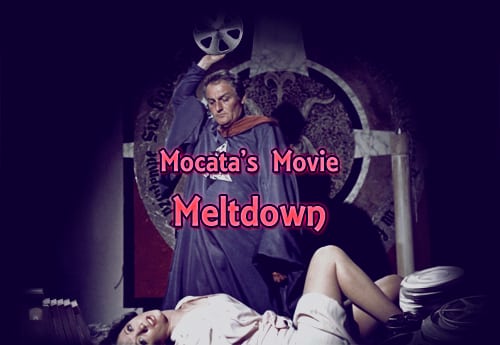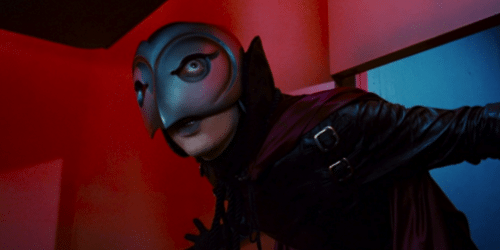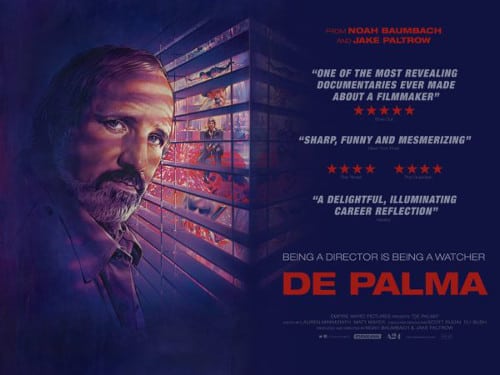Phantom of The Paradise (1974)
Directed by: Brian De Palma
Written by: Brian De Palma
Starring: Gerrit Graham, Jessica Harper, Paul Williams, William Finley

A musical may not the most… obvious choice for Halloween viewing. But of course there are a variety of exceptions to this rule out there. Pre-dating some of the more popular rock operas in this vein this is another take on the classic masked killer/masked avenger as the title suggests. But it combines the music (and screen presence) of Paul Williams with plenty of Brian De Palma’s own cinematic style, injecting new life to the Paris Opera tale we’re all familiar with. By deciding to move the action to the present day it also allows for a scathing fantasy vision of a parasitic music industry. As a result we’re treated to voice modulators and deaths by lighting fixtures. There’s also a twist on the material which merges the original novel’s Faust performance with the plot itself. Take a seat in the auditorium, it’s going to be a wild ride.
There’s a lot going on here but it helps to consider this another take on the Universal/Claude Rains adaptation of Phantom of the Opera, since the storyline about stolen music is still present. The 1940s version of the Phantom’s mask also bears some resemblance to the new design. It’s still a silver bird like creation, but it’s been merged with 1970s design chic and a sci-fi visor. And why the hell not. The electronic apparatus, the leather outfit and the black lipstick all work perfectly. Darth Vader clearly took some fashion tips from this guy. But the really interesting part is how fresh thematic meaning is added De Palma’s tale of diabolic pop moguls, all powerful corporations and disposable pop stars.
This is a story of fame hungry youngsters being chewed up and spat out as soon as the next big thing arrives. But the plot is familiar enough as composer Winslow Leach (William Finley) finds himself framed for drug dealing after a run in with thieving double dealing record label owner Swan (Paul Williams). He’s quickly sentenced after what can barely be called a trial montage and finds himself behind bars working on an assembly line. To make matters worse he’s also ‘volunteered’ for a dubious prison experiment that replaces his teeth with metal implants. At least they look intimidating when he’s in costume later! Adding insult to injury he escapes and forces his way into Swan’s property, only to be hideously burned by the machinery pressing fresh LPs of his stolen work.
Of course as things unravel this all completes the monstrous look required for him to become the eponymous ghoul. Finley as the title character is almost unrecognisable from his creepy turn in De Palma’s previous movie; the highly entertaining Hitchcock homage Sisters. Here he combines layers of sympathy and boiling rage that make it all work as an original character. A swirling cape and a robotic voice add the final touches. This whole first act has a great sense of momentum, particularly the wacky escape sequence. All the themes and visual elements come together nicely before it all begins to take a few unexpected turns.
Originally Paul Williams was set to play Winslow so he could be the musician on and off screen. Instead he gets to be the villain and do a mixture of the devil and the damned. Interestingly he’s the producer who steals the souls of creative minds… but is also in a Dorian Gray style predicament of his own. Here the cursed oil painting is replaced with video tape, what else! Rounding out the principle cast Jessica Harper brings a lot of charisma to the Phoenix, talented new star that both Swan and Winslow want to see rise to fame. She really gets to stuff in their auditions and also lends the role a certain charm which mirrors Winslow’s earlier naivety.

There are certainly a lot of influences at work but it never feels muddled. The sinister opening narration tells us exactly how it’s going to go down, and since it’s told from a perspective favourable to Swan you can tell it’s not going to be a happy ending. Singers are treated like whores at his palace and the logo of his company is plastered everywhere. For him anything goes when it comes to selling a product and massaging his narcissistic personality. Threats from the real life Swan Song record label mean much of this branding has been edited out or disguised, so I guess art and life are blurred which only strengthens the film’s message.
Swan is a sly devil and even after Winslow takes his first steps to settle the score he’s soon in the clutches of the corporation, with promises that the star of his choice, Phoenix, will perform his songs. All Winslow has to do is sign a sinister tome of a contract, in blood naturally. It’s a clever touch that after his accident the electronic vocoder he must use starts to become the singing voice of Paul Williams himself…. while Swan’s ‘real’ tones seem rather more scratchy and evil when they’re heard on play back. However Phoenix is soon to be replaced by a glam rock diva only known as ‘Beef’ (a likeably absurd performance from Gerrit Graham). Which of course means that the Phantom’s revenge plan quickly resurfaces.
Visually there are plenty of signature De Palma choices including the stylish split screen effects and various voyeuristic points of view. Who else would add a Psycho shower scene joke during a musical? Cartoonish electrocution gags are combined with gory stab wounds and flaming corpses, and insane fans chant for dead stars even as they’re being zipped up in body bags for everyone to see. It’s always a feast for the eyes whether these sequences are set inside the sinister ‘Death Records’ headquarters or Winslow’s new prison cell – the studio recording booth. The Phantom running through the crimson hallways of The Paradise theatre with his cloak flowing behind him is a particularly memorable sequence.
The grand finale tops all this by combining a sniper suspense sequence and a televised wedding party into one crazy spectacle set piece. The grisly fate of certain characters is treated as part of the show by the swathes of oblivious audience members and performers who never stop dancing. I guess a live assassination does make great entertainment as Swan himself so dryly puts it. This is a cult favourite for many reasons and it’s inevitable that the 1970s soundtrack won’t be for everyone. But for the amount of flare involved alone this is certainly up there amongst the greats from this decade, and it certainly deserves to be at the top when considering Brian De Palma’s body of work. An unholy genre melding romp of the best kind.





Be the first to comment